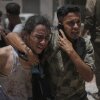
AFP journalist Khader Zaanoun poses for a picture in Gaza City on Tuesday. AFP journalists in the Gaza Strip say chronic food shortages are affecting their ability to cover Israel’s conflict with Hamas militants. AFP/Getty Images hide caption
toggle caption
AFP/Getty Images
French news agency Agence France-Presse is calling on the Israeli government to allow its freelance journalists to leave the Gaza Strip because of a worsening hunger crisis there.
“They’re spending so much time and energy trying to source food and also just they just feel so weak,” Phil Chetwynd, AFP’s global news director, told NPR’s Morning Edition on Tuesday about the situation for reporters and photographers the agency works with in Gaza. “They talk about constant headaches, constant dizziness. So just the ability physically to, you know, get to a story is diminished.”
Chetwynd was speaking a day after the journalists’ union at AFP issued a dramatic plea for help on Monday.
“Since AFP was founded in 1944,” the agency’s Society of Journalists said on X, “we have lost journalists in conflicts, some have been injured, others taken prisoner. But none of us can ever remember seeing colleagues die of hunger.”
The union described the situation of locally based AFP freelancers working in Gaza. Israel has not permitted independent access for international journalists to enter the enclave since Hamas’ Oct. 7, 2023, attack on Israel. The union quoted a Facebook post by a photographer: “I no longer have the strength to work for the media. My body is thin and I can’t work anymore.”

AFP journalist Bashar Taleb poses for a picture in the Gaza Strip on Tuesday. The agency’s Palestinian text, photo and video journalists say that shortages of food and water are making them sick and exhausted. AFP/Getty Images hide caption
toggle caption
AFP/Getty Images
The lack of access to food for the estimated 2 million Palestinians in Gaza has alarmed global leaders. Severe food shortages and widespread hunger continue, and Gaza health authorities say 25 children have died from “famine and malnutrition” in the past week.
On Tuesday, U.N. Secretary-General António Guterres warned that “malnourishment is soaring. Starvation is knocking on every door.”
Middle East
Local journalists in Gaza report on the war as foreign journalists still lack access
Local journalists in Gaza report on the war as foreign journalists still lack access
- Download
- Transcript
He told the Security Council that Gaza was a “horror show with a level of death and destruction without parallel in recent times.”
Reporting in Gaza has been deadly throughout the more than 21 months of conflict, with at least 186 journalists killed in the embattled enclave, the great majority Palestinian, and most often because of Israeli airstrikes, according to research by the Committee to Protect Journalists, or CPJ.

Palestinian journalists, children and families gather to demand an end to Israeli attacks and the entry of humanitarian aid, on July 19, in Gaza City. Highlighting the growing food shortage, demonstrators held banners reading “Gaza is starving,” “Stop the attacks,” and “We appeal to the world’s conscience.” Saeed M. M. T. Jaras/Anadolu via Getty Images hide caption
toggle caption
Saeed M. M. T. Jaras/Anadolu via Getty Images
But hunger has become a deepening challenge, as NPR’s Gaza-based producer Anas Baba explained in a story earlier this month, describing his experience seeking food from a site supported by the U.S. and Israel called the Gaza Humanitarian Foundation. He faced Israeli military fire, threats from private U.S. contractors, crowds fighting for rations and masked thieves.

Middle East conflict
Knives, bullets and thieves: the quest for food in Gaza
The Committee to Protect Journalists said this not only threatens the lives of the media workers in Gaza — it also leaves a widening impact on the information the world can obtain from the territory.
“As these journalists face starvation, displacement, and constant threat of attack, the international community risks losing its last independent source of reporting from inside Gaza,” CPJ Regional Director Sara Qudah said in an email to NPR. “That’s not just a loss of information—it’s a collapse in transparency, a blow to advocacy for civilians, and a dangerous opening for impunity. Silencing journalists under these conditions is not simply a media freedom issue—it’s a crisis of global accountability.”

World
Nearly 100 people killed seeking aid in Gaza on Sunday, Palestinian officials say
United Nations spokesperson Stéphane Dujarric told reporters on Tuesday: “I read the [AFP union] statement and it is heartbreaking. … It is a reminder of the work that those journalists who have stayed in Gaza, those Palestinians who have stayed in Gaza, are putting their lives on the line to report, in the face of fighting and in the face of hunger.”

Middle East conflict
Gaza war is deadliest conflict for journalists in over 30 years, press advocates say
Israel’s government did not respond to a request for comment about the AFP’s request to allow its journalists to leave Gaza.
The push from AFP received support from French Foreign Minister Jean-Noël Barrot on Tuesday, who said he hoped the journalists could be evacuated “in the coming weeks.” Barrot also called on the Israeli government to allow the international press back into Gaza.
Israeli authorities have previously brought groups of international journalists on military-led visits to Gaza and have said that they should not go to the territory unaccompanied for security reasons.
“I ask that the free and independent press be allowed to access Gaza to show what is happening there and to bear witness,” he told France Inter radio station.












